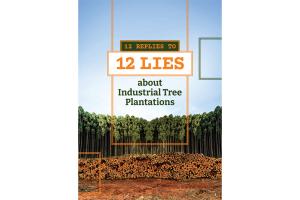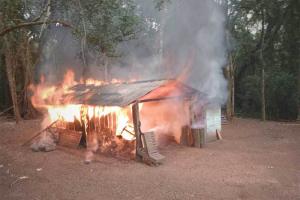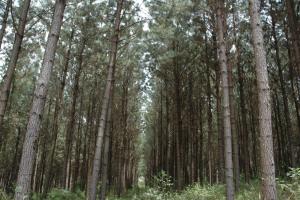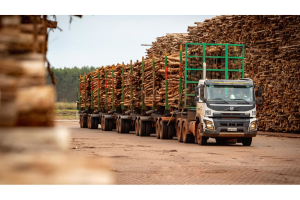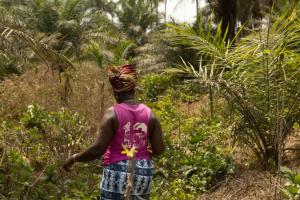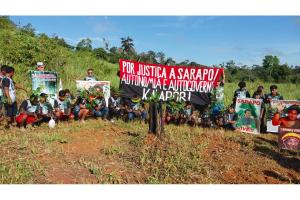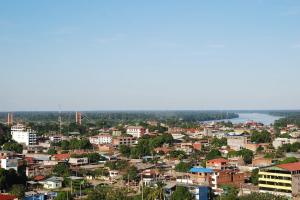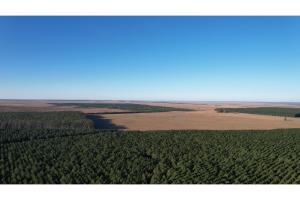Timber
Large-scale, intensively-managed and even-aged tree monocultures for timber production have been expanding onto communities’ fertile lands. They have destroyed forests and grasslands, especially in Latin America, Asia, and East and Southern Africa. The species used are exotic and fast-growing. They include varieties of eucalyptus, pine and teak trees.
Publications
21 September 2022
This publication exposes the most common misleading statements currently used by plantation companies. It’s is based on the briefing "Ten Replies to Ten Lies" written by Ricardo Carrere in 1999.
Bulletin articles
24 October 2024
Besides the direct impacts on communities’ lives, eucalyptus monoculture plantations represent absurd and obscene inequality. A group of 45 community people with whom we spoke was shocked to learn that it would take them 2,300 years of non-stop work to collectively earn the same amount that a single Portuguese family, one of the owners of the plantation company they work for, earned in one single year from the profits of their shares in the company.
Bulletin articles
22 August 2024
The Argentine province of Corrientes has the largest area of tree plantations in the country. 80% of the timber from these plantations goes to sawmills, where mountains of sawdust are regularly burned, causing serious health problems for neighboring communities. The local organization, Guardians of Y'vera, conducted a community health survey to highlight the problem, demand the relocation of these mills, and denounce the impacts of the forestry model.
Other information
22 August 2024
On July 5, 2024, three peasant families were violently evicted in Paraje San Lorenzo 2, in the municipality of Wanda, in the Argentine province of Misiones. The provincial police carried out the eviction, in collaboration with the multinational company, Arauco. During the operation, the police destroyed the ten-hectare farm which had been the families' livelihood for a decade.
Bulletin articles
28 June 2024
A new round of initiatives to plant tree plantation to provide carbon offsets is currently being proposed. Aside from the absurd notion—endorsed by the UN and various national governments—that tree plantations can offset the (climate) damage caused by burning fossil carbon, these initiatives have destroyed people's livelihoods and co-opted vast areas of community land.
Bulletin articles
28 June 2024
How many tree plantations are there, and how big are they? In what regions and countries are they located? What are the differences among the various "players" who are directly involved in implementing tree plantations for the carbon market? This article presents figures and information seeking to answer these and other questions.
Bulletin articles
27 June 2024
Behind every tree plantation developed for carbon offsets, there are external agents seeking to profit from increased control over the land. And while they all have the same colonial approach, these plantations can vary widely: they can be large-scale monocultures or schemes with smallholder farmers; they can include exotic species or native species; and some of them may even exist on paper only.
Articles
24 May 2024
Once again the Ka’apor people, through their ancestral organization TUXA TA PAME, has demonstrated its strength, on May 12, 13 and 14. They denounce the atrocities that Indigenous Peoples and quilombola and peasant traditional communities suffer in the hands large-scale landowners, loggers, mining corporations, gold diggers, carbon credit speculators and the agribusiness sector.
Other information
26 February 2024
The certifying company has turned a blind eye to the fact that the Peruvian government has not only not demarcated the indigenous territory but has also given the company two contracts for concessions.
Other information
25 October 2023
Alamindo Lestari Sejahtera (ALS) Group, that owns and controls at least three timber companies and industries in Papua, is expanding the business of timber forest products exploitation in the customary area of the Moi Tribe through a company called PT Hutan Hijau Papua Barat (HHPB).
Bulletin articles
22 July 2023
After 14 years of profiting from tree plantations—and at the cost of destroying wetlands and communities—the Harvard Management Company, one of the largest investment funds, sold 88,000 hectares in Corrientes to Argentina's largest electric power company, Central Puerto, which also wants to produce wood, biomass energy and carbon offsets.
Bulletin articles
11 October 2022
On the occasion of September 21st, 2022, the International Day of Struggle Against Monoculture Tree Plantations, WRM launched the briefing “12 Replies to 12 Lies about Industrial Tree Plantations”.
